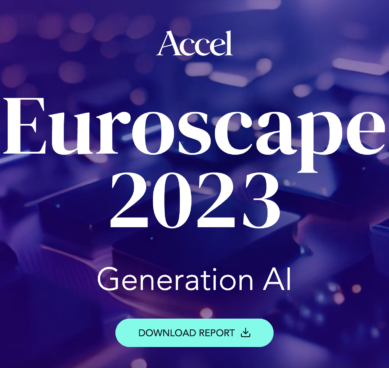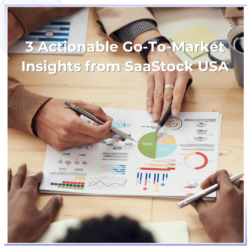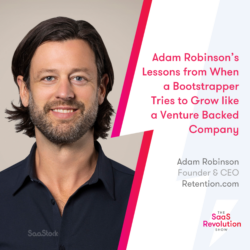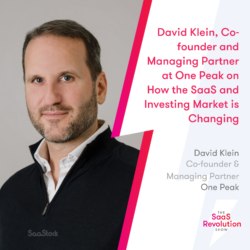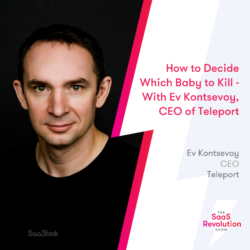By Philippe Botteri, Partner at Accel
Last year, the global cloud ecosystem experienced a deep reset. As I took to the SaaStock stage in Dublin last year with my colleague Richard, the figures (see Accel 2022 Euroscape) were pretty grim: $1.6T of public market cap had been lost on the global Euroscape Index and private cloud funding was down more than 40%. The question the software world was asking at the time was: “how far can everything keep falling?”
The good news today is that the bounceback is underway. In fact, according to our 2023 Euroscape report, a recovery is happening far faster than post-2000. Back then, it took the NASDAQ Index 14 years to return to 80% of its peak. Today, it’s taken just 18 months to reach the same milestone and this is due to a combination of solid balance sheets, the exponential growth of AI and the resilience of the US, European and Israeli cloud ecosystems.
Looking at the data more closely, what is the path to recovery looking like for software founders?
The market’s recovery has been fuelled by GenAI.
What is clear from the figures is that a new normal has emerged and everything has reverted back to the levels we saw in 2019. Global Euroscape multiples are reverting to the 10 year pre-covid average (6.1x NTM revenue) and, if we look at the venture financing market, $31B has been invested in private cloud companies across Europe, Israel and the US in 2023 YTD. This is not far from 2019’s $27B invested over the same timeframe. Similarly, new cloud / SaaS unicorn creation is tracing pre-covid levels, with 11 created in H1 2023 vs H1 2019’s 12. However, don’t be fooled. While the figures are reminiscent of those seen in 2019, the driving force for innovation and recovery has been GenAI.
Almost two thirds (60%) of the new cloud / SaaS unicorns created over the past 12 months are GenAI native, including Synthesia, AI21 Labs and Stability AI. In addition, there have been more than 20 investment rounds of over $100M each in GenAI companies across Europe and Israel and almost 40 GenAI rounds over $100M in the US. GenAI’s impact has also been seen on the public markets, fuelling Nvidia’s climb to the $1T club.
Europe and Israel maintain cloud strength, but there’s everything to play for with GenAI.
Europe and Israel maintain their relative strength against the US ecosystem, with total European and Israeli VC funding in SaaS / Cloud in 2023 YTD standing at more than half (53%) of that in the US. This sees the region continue its climb from securing 36% of US cloud / SaaS VC financing in 2019 and 46% in 2020. However, the US is leagues ahead when it comes to GenAI funding. The $14.1B invested in the US’ seven largest GenAI deals towers over Europe and Israel’s $0.9B, with most of the US investments so far going into foundational models where the US has had an advantage. The largest rounds have been seen in companies such as OpenAI, Inflection and Anthropic.
That being said, GenAI is a secular trend and we’re still at the very early innings. Europe’s deep GenAI talent pool continues to shine through, with Stable Diffusion springing out of LMU and promising startups such as Mistral and Synthesia being created across the region. As we see investment moving from large models to more specialised models focusing on specific industries, such as construction, pharma and legal, we expect to see Europe and Israel catch-up with the US in the funding stakes. In addition, European talent has produced 50% more AI journal publications than the US, with a similar citation rate.
The impact of GenAI should not be underestimated.
Over the last 12 months’ return to reality, GenAI has been the trend to watch. It’s transforming the software paradigm and unleashing previously unimaginable opportunities. We’re seeing a dramatic impact across three key areas:
Enterprise automation: this is proving the best path to deliver on the promise of AI. GenAI is pushing the boundaries of automation, enabling enterprises to automate incredibly complex processes. For example, companies such as UiPath, which has been using AI to deliver enterprise automation at scale, are now incorporating GenAI into their platforms to deliver even greater impact to their customers.
Media creation: GenAI is drastically reducing both the cost and time taken to create digital media, as well as creating new use cases. Take, for example, Synthesia. The company’s platform can reduce video production time by 95%, making it a cost effective solution, but it also improves engagement by replacing text with avatars and enabling instant video creation for communication and learning. There’s also Assembly.ai, which enables companies to build AI applications with voice data and turns voice calls into text to categorise calls, analyse sentiments or redact confidential information.
Cybersecurity: Cybersecurity continues to be a key trend, with the five fastest growing Euroscape companies dominated by cybersecurity: SentinelOne,CrowdStrike, Zscaler. With cloud exploitation growing by 95% in 2022 (CrowdStrike’s Global Threat Report) and key challenges securing human and machine identities as well as the software supply chain, this looks set to continue. Now, GenAI is being incorporated into cybersecurity solutions to improve their capabilities. Snyk, the leading developer security company, uses GenAI to analyse vulnerabilities in code and suggest fixes. Cyera, an early leader in cloud data security, uses AI to precisely identify the contents of cloud data stores and earmark sensitive data.
As our data shows, Europe and Israel are well positioned to take advantage of the rise of AI with multiple research and talent hubs across the region. We’re excited by what the next decade will bring to the cloud ecosystem.
Philippe Botteri is a Partner at Accel. He has worked in the venture industry for the last 16 years, with a particular focus on cloud computing and security investments. His VC career started back in 2006 in Silicon Valley and, over the next five years, he witnessed the cloud and SaaS ecosystem gain momentum and many foundational SaaS companies emerge. Moving back to Europe in 2011 when he joined Accel, Philippe spotted the green shoots of Europe’s first cloud companies emerge and, by 2016, was publishing his annual Euroscape report, which maps out the top 100 European and Israeli cloud and SaaS companies.
Philippe’s portfolio over the last decade represents some of the most recognisable cloud companies globally. Prior to Accel, Philippe was with Bessemer, based in Menlo Park, where he helped build the firm’s cloud practice, working on investments including Cornerstone OnDemand (NASDAQ: CSOD), Eloqua (NASDAQ: ELOQ) and Criteo (NASDAQ: CRTO). He started his career with McKinsey&Co. Philippe is from Paris and graduated from Ecole Polytechnique, where he is a member of the Entrepreneurship Advisory Board, and Ecole des Mines.
